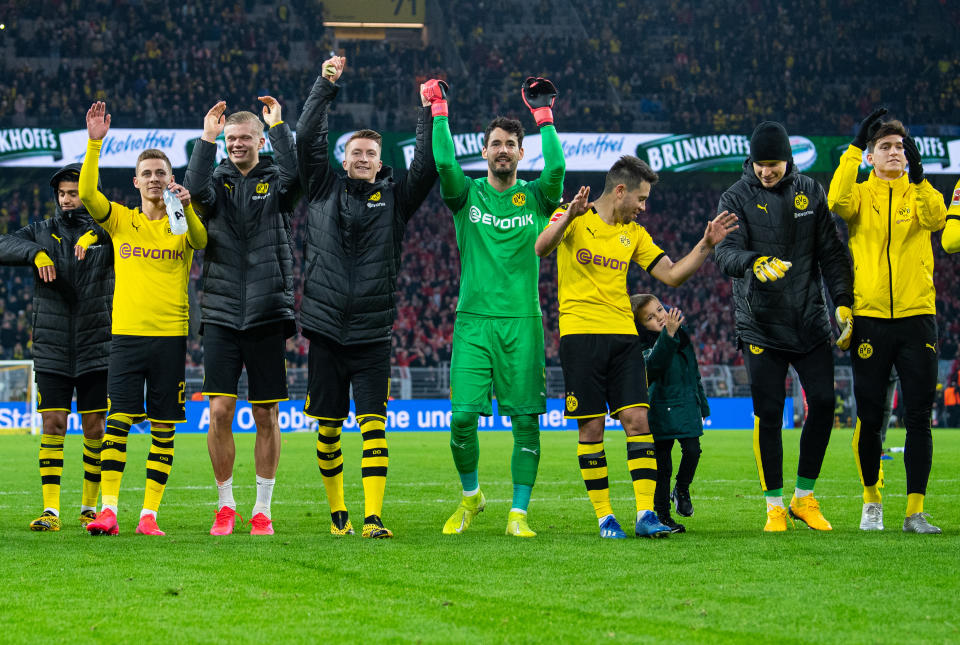Why the Bundesliga's response to the coronavirus is an example for other leagues
In 2003, Bayern Munich did something unprecedented in the ultra-competitive world of soccer.
Rivals Borussia Dortmund were on the brink of bankruptcy, having spent well beyond their means in the seven years following what remains their only Champions League victory. Rather than bask in the glow of schadenfreude, Bayern instead chose to save their rivals from ruin with an interest-free loan of $2.2 million.
“It was a critical situation for Borussia Dortmund,” said then-Bayern president Uli Hoeness. “When they couldn't even pay their salaries we thought we should help. I'm a big fan of tradition in sport and I think it was the right thing to do."“
Details of the loan only emerged nine years later, proving that it was not provided by the Bavarians as a means of boasting or positive publicity. It came from good intentions, a sense of solidarity and a true spirit of community.
Such a spirit runs through German soccer, where the “50+1 rule” ensures the majority of Bundesliga teams are majority-owned by their fans. With the fan ownership model, affordable ticket pricing and strong sense of community, preserving the sanctity of the sport is deemed far more important than the influence of overseas and corporate investment that are commonplace in other major leagues.
Evidently, the virtuous approach to soccer in Germany extends to the current coronavirus crisis.

In March, less than two weeks after the Bundesliga was suspended, the league’s four Champions League participants from this season pooled their resources to create a $21.7 million solidarity fund to help all clubs in the top two tiers. The bulk of the proceeds have been generated by the joint decision of the four clubs, Bayern, Dortmund, Bayer Leverkusen and RB Leipzig, to forgo their share of domestic TV rights payments next season.
“We have always said that we would show solidarity if clubs, through no fault of their own, should run into difficulties that they can no longer overcome themselves,” said Dortmund CEO Hans-Joachim Watzke, who has volunteered to waive a third of his monthly salary. “We are prepared to help out other professional football clubs if it is ultimately a matter of cushioning the financial effects of the pandemic.”
The payments will be most welcome for the majority of Bundesliga and 2. Bundesliga sides, who are keen to restart the season, in order to stave off financial ruin. Around 56,000 people work in the German soccer industry, with reports suggesting that 13 of the 36 clubs in the top two flights will face insolvency if play is not resumed by May, which Bundesliga chief executive Christian Seifert told the New York Times is now the plan.
Furthermore, according to Forbes, German soccer could lose around $836 million in television revenue if the season is not finished. Hence, all Bundesliga clubs have now been allowed to return to training, subject to strict safety requirements.
It is likely that games will be attempted behind closed doors. Excluding fans is antithetical to the community-driven nature of German sport, and it would not be a popular decision. However, the stakes are high, and like most decisions in German soccer, the intentions are good.
In addition to the fund from the top four clubs, many other Bundesliga sides have taken it upon themselves to reduce or waive salaries. Borussia Mönchengladbach were the first top-flight team to make the gesture, with players, coaches and directors volunteering to cut their wages.
FC Union Berlin, meanwhile, announced that their first team have entirely waived their salaries for the foreseeable future.
In German soccer, a desire to pitch in and help during a time of crisis is prevalent. No one is being strong-armed by governing bodies into giving up salaries. Helping others is not prescribed; it is a reflex that comes without controversy.
Compare and contrast this approach with the Premier League.
A Premier League proposal to reduce wages by 30 percent was refused by the Professional Footballers Association, which claimed the tax implications would damage the UK government and the National Health Service. By their logic, the annual reduction in wages would result in a $217 million shortfall in tax collection. It’s a reasonable argument, but one of poor optics for the league. According to Wayne Rooney, it’s put players in a “no-win situation.”
Further controversy has arisen from some clubs deciding to furlough non-playing staff. Liverpool said it would too, but reversed the decision due to the backlash.
There are likely hundreds of players in England who would like to reduce or forgo their salaries to help during this difficult time. However, their union has put them in a difficult position, while several wealthy clubs are forcing non-playing staff to sacrifice income. Meanwhile, players such as Kyle Walker and Jack Grealish have been caught breaking isolation guidelines, in salacious and embarrassing fashion.
Mishandling the coronavirus is not just a Premier League problem. La Liga has also failed to enforce a universal wage cut among its players. Atletico Madrid and Barcelona have enforced 70 percent wage cuts for their respective players — with the Catalans finding themselves in an unexpectedly precarious financial situation — but Lionel Messi took to his Instagram account to complain about the heavy-handed manner in which the salary cut was imposed.
It is trite to suggest that the Bundesliga always does things the right way. However, in contrast to many other leagues around the world, they are handling the pandemic’s impact in an exemplary fashion.
“The Football Association is handling the problem quite well,” said Bayern Munich chairman Karl-Heinz Rummenigge. “Everything happens in a harmonious, supportive and loyal way.”
Given the stark contrast to England’s top flight, it’s hard to disagree.
More from Yahoo Sports:


